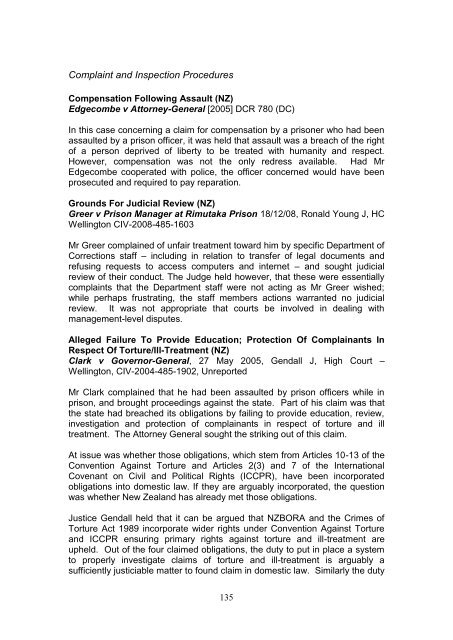Human Rights and Prisons - Rethinking Crime and Punishment
Human Rights and Prisons - Rethinking Crime and Punishment
Human Rights and Prisons - Rethinking Crime and Punishment
Create successful ePaper yourself
Turn your PDF publications into a flip-book with our unique Google optimized e-Paper software.
Complaint <strong>and</strong> Inspection Procedures<br />
Compensation Following Assault (NZ)<br />
Edgecombe v Attorney-General [2005] DCR 780 (DC)<br />
In this case concerning a claim for compensation by a prisoner who had been<br />
assaulted by a prison officer, it was held that assault was a breach of the right<br />
of a person deprived of liberty to be treated with humanity <strong>and</strong> respect.<br />
However, compensation was not the only redress available. Had Mr<br />
Edgecombe cooperated with police, the officer concerned would have been<br />
prosecuted <strong>and</strong> required to pay reparation.<br />
Grounds For Judicial Review (NZ)<br />
Greer v Prison Manager at Rimutaka Prison 18/12/08, Ronald Young J, HC<br />
Wellington CIV-2008-485-1603<br />
Mr Greer complained of unfair treatment toward him by specific Department of<br />
Corrections staff – including in relation to transfer of legal documents <strong>and</strong><br />
refusing requests to access computers <strong>and</strong> internet – <strong>and</strong> sought judicial<br />
review of their conduct. The Judge held however, that these were essentially<br />
complaints that the Department staff were not acting as Mr Greer wished;<br />
while perhaps frustrating, the staff members actions warranted no judicial<br />
review. It was not appropriate that courts be involved in dealing with<br />
management-level disputes.<br />
Alleged Failure To Provide Education; Protection Of Complainants In<br />
Respect Of Torture/Ill-Treatment (NZ)<br />
Clark v Governor-General, 27 May 2005, Gendall J, High Court –<br />
Wellington, CIV-2004-485-1902, Unreported<br />
Mr Clark complained that he had been assaulted by prison officers while in<br />
prison, <strong>and</strong> brought proceedings against the state. Part of his claim was that<br />
the state had breached its obligations by failing to provide education, review,<br />
investigation <strong>and</strong> protection of complainants in respect of torture <strong>and</strong> ill<br />
treatment. The Attorney General sought the striking out of this claim.<br />
At issue was whether those obligations, which stem from Articles 10-13 of the<br />
Convention Against Torture <strong>and</strong> Articles 2(3) <strong>and</strong> 7 of the International<br />
Covenant on Civil <strong>and</strong> Political <strong>Rights</strong> (ICCPR), have been incorporated<br />
obligations into domestic law. If they are arguably incorporated, the question<br />
was whether New Zeal<strong>and</strong> has already met those obligations.<br />
Justice Gendall held that it can be argued that NZBORA <strong>and</strong> the <strong>Crime</strong>s of<br />
Torture Act 1989 incorporate wider rights under Convention Against Torture<br />
<strong>and</strong> ICCPR ensuring primary rights against torture <strong>and</strong> ill-treatment are<br />
upheld. Out of the four claimed obligations, the duty to put in place a system<br />
to properly investigate claims of torture <strong>and</strong> ill-treatment is arguably a<br />
sufficiently justiciable matter to found claim in domestic law. Similarly the duty<br />
135
















